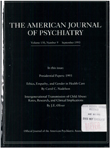Are schizophrenia and affective disorder related? A selective literature review
Abstract
OBJECTIVE: Although most modern investigators accept the Kraepelinian view that schizophrenia and affective disorder are biologically distinct, others have suggested the psychoses are on a continuum of liability. This article is a selective review of evidence for the continuum model. METHOD: The author focuses on family, twin, and adoption data that do not support the Kraepelinian view of psychosis. Evidence characterized to a lesser extent includes the frequency of intermediate forms of illness (i.e., schizoaffective disorder), the inability to separate psychoses by classical symptoms into well-defined clusters, and the inability of laboratory measures to clearly define psychotic subgroups. RESULTS: The data demonstrate that schizophrenia and affective disorder do co-occur in some families. Whether this co- occurrence reflects true overlap is unclear, and significant pathophysiological heterogeneity may underlie clinical continuity. In some recent studies the inclusion of nonmelancholic depressions in the affective illness category may have masked overlap. CONCLUSIONS: The author suggests that the Kraepelinian view of psychoses may need modification. Future research should focus on factors that may reveal overlap between schizophrenia and affective disorder: severity of schizophrenia and affective disorder in probands, severity of depression in relatives, the effect of the unipolar-bipolar disorder relationship on the co-occurrence of affective disorder and schizophrenia, and the relationship of nongenetic factors that might alter the clinical expression of a shared genotype. Also, investigators should not presume a dichotomy or continuum but should examine pure and mixed pedigrees and look for state- and trait-related endophenotypes, the convergence of which would provide the basis for focused molecular genetic study.
Access content
To read the fulltext, please use one of the options below to sign in or purchase access.- Personal login
- Institutional Login
- Sign in via OpenAthens
- Register for access
-
Please login/register if you wish to pair your device and check access availability.
Not a subscriber?
PsychiatryOnline subscription options offer access to the DSM-5 library, books, journals, CME, and patient resources. This all-in-one virtual library provides psychiatrists and mental health professionals with key resources for diagnosis, treatment, research, and professional development.
Need more help? PsychiatryOnline Customer Service may be reached by emailing [email protected] or by calling 800-368-5777 (in the U.S.) or 703-907-7322 (outside the U.S.).



